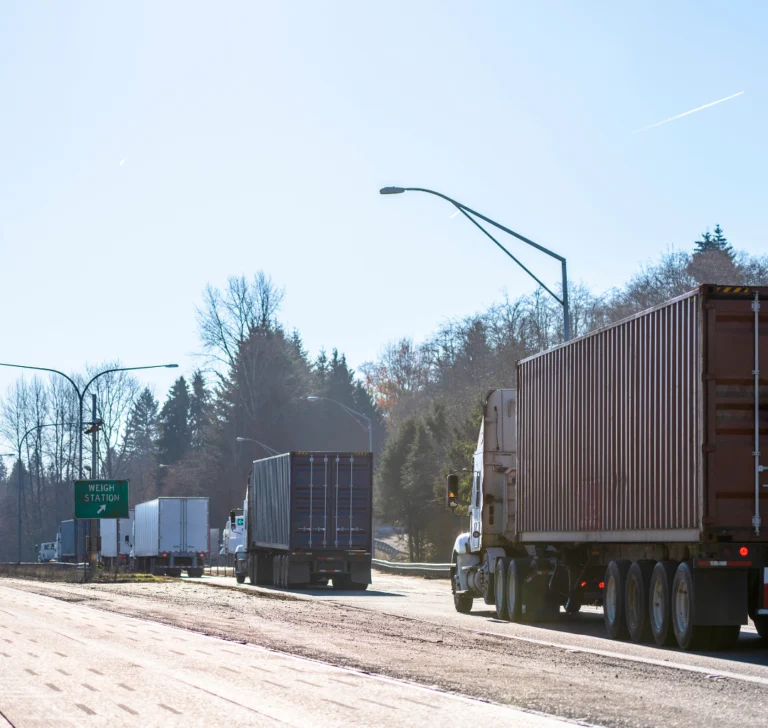The transportation industry opposes increasing the size and weight limits for commercial trucks.
The transportation industry opposes increasing the size and weight limits for commercial trucks. In recent days, more than 2,200 local government leaders from across the country have expressed their opposition to proposed increases in truck size and weight, including heavier single-trailer trucks, through a letter sent to Congress.
Organized by the Coalition Against Bigger Trucks (CABT), the letter was signed by municipal and county officials, as well as public works directors and engineers from across the United States. In it, they state that the nation’s infrastructure is in poor condition, as local roads and bridges were not built to the same standards as interstate highways. “The impact of heavier or longer trailer trucks would only worsen these problems,” CABT argued.

Transportation industry vs. increased weight limits for commercial trucks
The transportation industry has repeatedly voiced its opposition to increasing weight limits for commercial trucks. In 2023, organizations such as the Owner-Operator Independent Drivers Association (OOIDA), the Truckload Carriers Association (TCA), and the Teamsters Union opposed H.R. 3372 a bill that proposed a 10-year pilot program allowing trucks to operate at weights of up to 91,000 pounds. Although states could choose whether to participate, the initiative did not advance in the House of Representatives.
This year, those same groups reaffirmed their stance during testimony before the House Transportation and Infrastructure Committee. Nevertheless, CABT states that transportation companies are currently pushing several proposals to raise the federal weight limit. These include a pilot program for 91,000-pound trucks to assess crash rates, a provision allowing logging trucks of up to 154,000 pounds, and a measure that would give governors the authority to set interstate weight limits within their states, potentially fragmenting federal regulation and harming interstate commerce.
A CABT study published this year warned that such increases could endanger up to 82,457 local bridges, with estimated replacement costs reaching $98.6 billion. In response, Representative Jerrold Nadler of New York voiced his concern, noting that trucks ultimately rely on local infrastructure, not just the interstate system.

Consequences of heavier trucks: damage to local infrastructure
The debate over increasing truck weight limits has been one of the most prominent issues in the road transport industry. Despite opposition, some states have already implemented or are considering adjustments to permitted weight limits.
The Executive Director of the Minnesota Association of Townships, also a board member of the National Association of Towns and Townships, warned that although these proposals focus on interstate highways, local infrastructure will be directly impacted. He pointed out that trucks don’t just travel on highways; they rely on local roads and bridges to load, unload, park, and rest all of which place strain on local infrastructure.
CABT continues to argue that heavier trucks significantly damage local structures. Similarly, the U.S. Department of Transportation, in its comprehensive 2016 study on truck size and weight limits, recommended against increasing them. This position reinforces the need for investment in infrastructure improvements before considering any increase in commercial truck weight limits.

The Wildest Truck Modifications on the Road Today
Truck customization has become a serious industry, with some builds rivaling high-end RV conversions in complexity and cost. From redesigned sleepers to upgraded suspension systems, these modifications do more than change appearance — they alter weight, electrical load, and the technical profile of the truck.

The most dangerous states in the U.S. during winter weather
While winter conditions are hazardous across the country, some states experience significantly higher accident rates during this season. A study by Samsara, a safety and

Winter storm disruptions lead to FMCSA HOS relief in 40 states
Motor carriers and drivers providing direct assistance in relief efforts in the affected states are covered by a hours-of-service (HOS) exemption. Over the weekend, a

Air Quality Alert in California Impacts Transportation
An air quality alert has been issued as high levels of fine particle pollution (PM2.5) trigger health warnings across several parts of California. The situation is affecting visibility, driver health, and logistics operations, forcing transportation professionals to take extra precautions on highways and in urban corridors

Winter Storm Survival on the Road: What Truck Drivers and Fleet Operators Need to Know Now
Winter storm with snow, ice, and extreme cold are creating dangerous highway conditions across multiple states, forcing truckers to make critical safety decisions before turning the key.

Miles of love: stories of truckers and their four-legged co-pilots
The love between truckers and their pets is a strong bond, and these stories will surely warm your soul. Love manifests itself in many ways,
